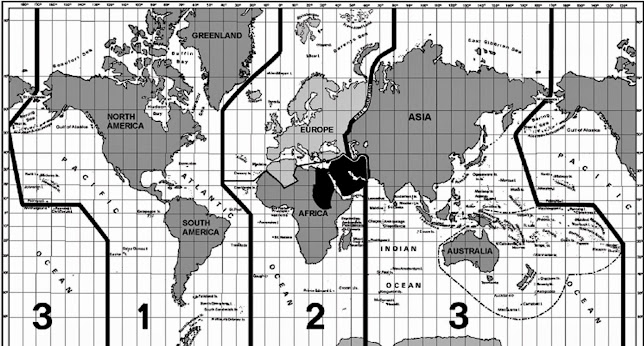Traffic Conference Areas
Traffic Conference Areas
Geographically the world is divided into four parts that are the Western hemisphere, Eastern Hemisphere, Southern Hemisphere, and Northern Hemisphere. The Equator is the imaginary line that passes horizontally and divides the earth equally, Similarly prime meridian is the line that passes vertically and divides the earth equally. The area which is to the south of Equator is termed as Southern Hemisphere and to the north of the equator is termed as Northern Hemisphere. Similarly, the countries or area which lies to the west of the prime meridian is called Western Hemisphere and to the east of the prime meridian is called Eastern Hemisphere. However, if this rule followed for Air travel it will cause confusion as the prime meridian which passes through London passes through many countries making it difficult to follow and the same applies to equator as well. Hence to negate this issue IATA has divided the globe into the Western hemisphere comprising only the Americas and Greenland and Eastern hemisphere which comprises every other continent. For further segregation, the globe is divided into 3 areas also known as Traffic Conferences-TC1, TC2, TC3. IATA map is covered in many aviation basic training because it is highly used while calculating Air Fares and Rates and when applying Air Travel Rules.
Traffic Conference Areas also known as IATA MAP, it is has many different names, such as IATA world map, IATA geography, IATA TC areas, and IATA traffic conference areas. IATA has been leading airline industry for over 70 years by its traffic conferences provisions which was agreed by IATA member airlines in many formal IATA traffic conferences which had been located in different parts of the world.
IATA International Air Transport Association is a commercial community of the most international airlines over the world. IATA vision is to shape the future growth of safe, secure and sustainable air transport by representing, leading, and serving the airline industry. IATA has been working to achieve its aims since April,1945. IATA starts forming its world geography to manage and solve the commercial matters of air transport such as rates, routes and schedules and many other commercial matters.
It was difficult for IATA to solve commercial matters in one traffic conference in one location due to many reasons such as governments approvals, economic factors, lowering the costs etc.
In 1947, the traffic conference locations became three in different parts of the world.
IATA Area / IATA Tariff Sub – Area
IATA defines the world into 3 areas (IATA area 1/2/3), and defines the IATA area into small areas (IATA Tariff sub-area).
Area
IATA Area 1 - North America / South America / Hawaii etc.
Sub – Area - North America (USA, Canada and Mexico)
Caribbean Islands
Central America
South America (Brazil, Chile, Peru etc.)
IATA Area 2 - Europe / Middle East etc.
Sub – Area - Europe
Russia (West of the Urals)
Africa
Middle East
IATA Area 3 - Japan / South Korea / Thailand / Singapore / Philippines / India / Guam etc.
Sub – Area - Russia (East of the Urals)
Japan and South Korea
South East Asia (China, Singapore, Thai, Vietnam, Guam etc.)
South Asia (India etc.)
South East Pacific (Australia, New Zealand etc.)
ESTABLISHMENT OF TRAFFIC CONFERENCES:
1. The following Traffic Conferences are established for passenger matters:
(i) Passenger Procedures Conferences, with worldwide authority, comprising:
Passenger Services Conference
Passenger Agency Conference
(ii) Passenger Tariff Coordinating Conferences comprising:
a) Conferences having authority with respect to traffic within the individual
geographical area indicated by the numeral in its name, as follows:
Passenger Tariff Conference 1
Passenger Tariff Conference 2
Passenger Tariff Conference 3
b) Conferences having authority with respect to traffic between the
geographical areas indicated by the numerals in its name, as follows:
Passenger Tariff Conference 1/2
Passenger Tariff Conference 2/3
Passenger Tariff Conference 3/1
Passenger Tariff Conference 1/2/3
2. The following Traffic Conferences are established for cargo matters:
(i) Cargo Procedures Conferences, with worldwide authority, comprising:
Cargo Services Conference
Cargo Agency Conference
(ii) Cargo Tariff Coordinating Conferences comprising:
a) Conferences having authority with respect to traffic within the individual
geographical area indicated by the numeral in its name, as follows:
Cargo Tariff Conference 1
Cargo Tariff Conference 2
Cargo Tariff Conference 3
b) Conferences having authority with respect to traffic between geographical
areas indicated by the numerals in its name, as follows:
Cargo Tariff Conference 1/2
Cargo Tariff Conference 2/3
Cargo Tariff Conference 3/1
Cargo Tariff Conference 1/2/3
MEMBERSHIP of All Conferences
There shall be two classes of Members of Traffic Conferences, voting Members and non-voting Members.
OBSERVERS
The Director General of IATA may invite the Secretariat of the International Civil Aviation Organization (ICAO), the Commission of the European Communities, the Secretariat of Regional Organizations of Government Civil Aviation Authorities, the Secretariat of Regional Organizations of Scheduled Airlines and any Government formally expressing a requirement to attend to be represented by one or more observers at any appropriate Traffic Conference sessions.
COMMITTEES AND WORKING GROUPS
A Cost Committee is hereby established which shall analyse costs periodically, shall make observations thereon to the Traffic Conferences and shall develop other cost/financial data as requested by the Traffic Conferences or the Director General.
The following Committees with their terms of reference are established within the
Conference:
1. Reservations Committee
2. Passenger Forms and Procedures Committee
3. Airport Services Committee
4. Passenger Agency Procedures Committee
5. Bank Settlement Plan Committee
6. Passenger Agency Training Committee
7. Cargo Agency Procedures Committee
8. Cargo Accounts Settlement System Committee
9. Cargo Agency Training Committee
Source: talearning, aviation-professional, IATA





Comments
Post a Comment